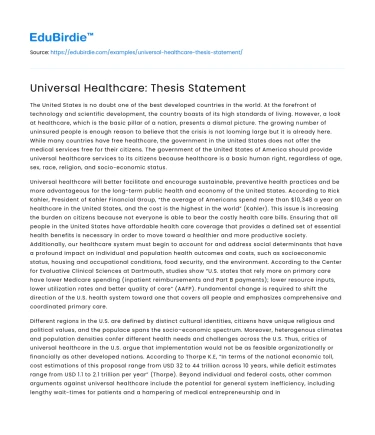The United States is no doubt one of the best developed countries in the world. At the forefront of technology and scientific development, the country boasts of its high standards of living. However, a look at healthcare, which is the basic pillar of a nation, presents a dismal picture. The growing number of uninsured people is enough reason to believe that the crisis is not looming large but it is already here. While many countries have free healthcare, the government in the United States does not offer the medical services free for their citizens. The government of the United States of America should provide universal healthcare services to its citizens because healthcare is a basic human right, regardless of age, sex, race, religion, and socio-economic status.
Universal healthcare will better facilitate and encourage sustainable, preventive health practices and be more advantageous for the long-term public health and economy of the United States. According to Rick Kahler, President of Kahler Financial Group, “the average of Americans spend more than $10,348 a year on healthcare in the United States, and the cost is the highest in the world” (Kahler). This issue is increasing the burden on citizens because not everyone is able to bear the costly health care bills. Ensuring that all people in the United States have affordable health care coverage that provides a defined set of essential health benefits is necessary in order to move toward a healthier and more productive society. Additionally, our healthcare system must begin to account for and address social determinants that have a profound impact on individual and population health outcomes and costs, such as socioeconomic status, housing and occupational conditions, food security, and the environment. According to the Center for Evaluative Clinical Sciences at Dartmouth, studies show “U.S. states that rely more on primary care have lower Medicare spending (inpatient reimbursements and Part B payments); lower resource inputs, lower utilization rates and better quality of care” (AAFP). Fundamental change is required to shift the direction of the U.S. health system toward one that covers all people and emphasizes comprehensive and coordinated primary care.
Save your time!
We can take care of your essay
- Proper editing and formatting
- Free revision, title page, and bibliography
- Flexible prices and money-back guarantee
Different regions in the U.S. are defined by distinct cultural identities, citizens have unique religious and political values, and the populace spans the socio–economic spectrum. Moreover, heterogenous climates and population densities confer different health needs and challenges across the U.S. Thus, critics of universal healthcare in the U.S. argue that implementation would not be as feasible organizationally or financially as other developed nations. According to Thorpe K.E, “In terms of the national economic toll, cost estimations of this proposal range from USD 32 to 44 trillion across 10 years, while deficit estimates range from USD 1.1 to 2.1 trillion per year” (Thorpe). Beyond individual and federal costs, other common arguments against universal healthcare include the potential for general system inefficiency, including lengthy wait-times for patients and a hampering of medical entrepreneurship and innovation. However, perhaps the most striking advantage of a universal healthcare system in the U.S. is the potential to address the epidemic level of non- communicable chronic diseases such as cardiovascular diseases, type II diabetes, and obesity, all of which strain the national economy. Accessible, affordable healthcare may enable earlier intervention to prevent or limit risk associated with non-communicable chronic diseases, improve the overall public health of the U.S., and decrease the economic strain associated with an unhealthy low- socioeconomic status.
When the population gets healthcare for free, it leads to a decrease in the number of sick people. Hence, being health care free can create numerous healthy people. If people can acquire treatment for free without worrying about the payment, it will help them to find treatment quickly and prevent the transmissible diseases. “People who get health care easily will be healthier, have more productive lives, and they may contribute positively to the community” (Mozaffarian, Rogoff, Ludwig). In other words, free healthcare for people helps to avoid common ailments. Furthermore, it helps them to live longer and achieve a healthy life with more productivity. With this solution, people will not be afraid of affording healthcare with common diseases. Moreover, the government should create equality between people. All inhabitants have the right to receive health care because all of the citizens play an essential role in society. Despite social status, poor people could obtain the same kind of health care that will be provided to wealthy people. This way will provide primary services for all people without any discrimination between them. Some studies show that poor people are “more likely to experience difficulties to access medical services.“






 Stuck on your essay?
Stuck on your essay?

